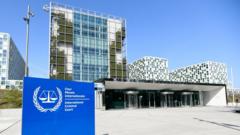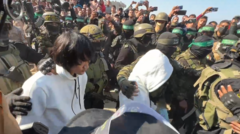Established to address atrocities and encourage accountability among world leaders, the International Criminal Court (ICC) plays a crucial role in international law, struggling with its jurisdiction and influence due to the absence of key nations like the US and Israel.
Understanding the Role and Function of the International Criminal Court

Understanding the Role and Function of the International Criminal Court
The ICC serves as a global judicial body to prosecute severe crimes and hold accountable those responsible for genocide and war crimes.
The International Criminal Court (ICC) is a pivotal institution in the fight against impunity for some of the world's gravest crimes, such as genocide, war crimes, and crimes against humanity. Based in The Hague, Netherlands, the ICC was founded in 2002 to serve as a global forum for holding accountable leaders who commit such atrocities. Its establishment followed worldwide calls for a robust mechanism to confront the aftermath of tragedies like the Yugoslav Wars and the Rwandan Genocide.
The ICC acts as a court of last resort, intervening only when national jurisdictions are unable or unwilling to prosecute offenders. Its jurisdiction is reserved for crimes committed after July 1, 2002, the date the Rome Statute, which governs the court, came into effect. Currently, 124 nations have ratified the statute, while an additional 34 have signed it, indicating potential future membership. Notably, both Israel and the United States have opted out of joining the court, which complicates its universal authority.
Since its inception, the ICC has engaged in various high-profile cases, including the conviction of Thomas Lubanga in March 2012 for child soldiering violations in the Democratic Republic of the Congo, and the acquittal of Ivory Coast's former President Laurent Gbagbo on all charges of murder and other inhumane acts. Other notorious figures, like Joseph Kony of the Lord's Resistance Army and former Sudanese President Omar al-Bashir, remain wanted by the court for heinous crimes.
In recent news, the ICC issued an arrest warrant for Russian President Vladimir Putin in 2023, citing his alleged involvement in war crimes, particularly concerning the forced deportation of children from Ukraine. Despite its efforts, the ICC has faced criticism, particularly from African Union members who underscore a perceived bias due to the court’s African-focused investigations. The ICC defends its stance, asserting that many cases have arisen from self-referrals or UN Security Council action.
The court lacks its means of enforcement, relying on national police forces for arrests and transfers to The Hague. Investigations can commence via referrals from the UN Security Council or member states, and cases can be pursued at the prosecutor's discretion with judicial approval. Cases undergo a rigorous trial process, where judges evaluate evidence to determine the guilt of defendants.
The absence of the United States from the ICC has been a contentious issue. During negotiations to establish the court, the US feared the potential for politically motivated prosecutions against its soldiers, ultimately leading to its lack of endorsement. In notable instances, such as the sharing of intelligence on Russian war crimes in Ukraine, the US has shown willingness to engage with the ICC in specific matters.
Some important global players, such as China, India, and Russia, also remain outside the ICC's jurisdiction, either by never signing or ratifying the Rome Statute. To empower its judicial functions, member states must bolster their domestic legal frameworks to eliminate any gaps that could prompt ICC interventions.
The ICC’s operations are funded by its member states, following a financial model reflecting nations’ economic capabilities. The absence of significant participants like the US results in increased financial pressure on other countries, with the UK, Japan, Germany, and France among the leading contributors.























